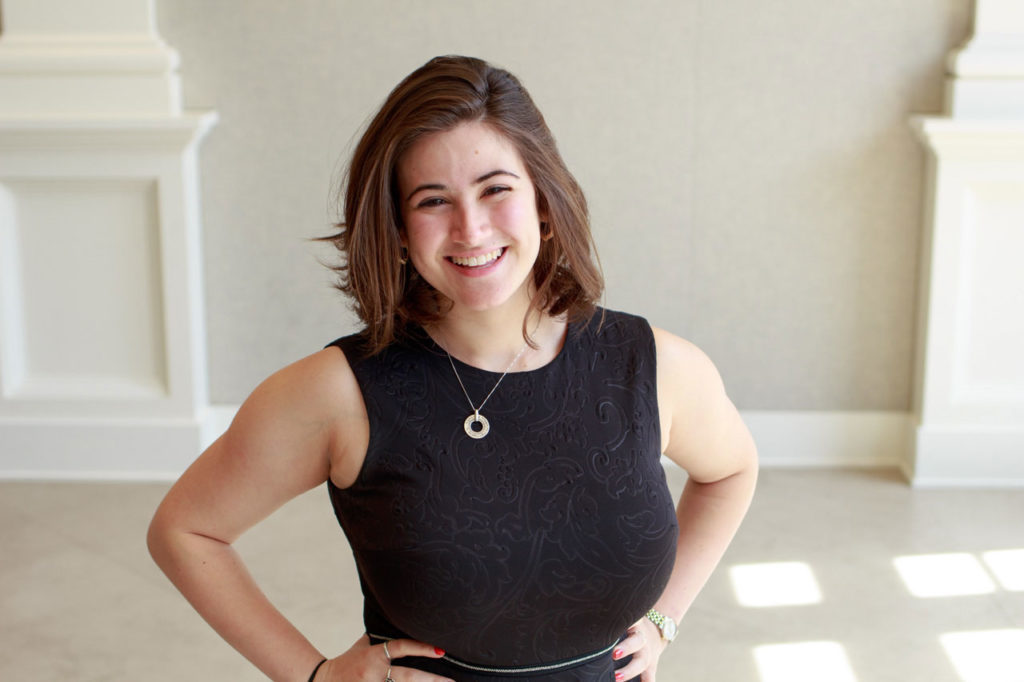To prevent drug-facilitated sexual assaults, one student is working to develop a product that will detect date rape drugs in a drink using only a napkin.
Junior Danya Sherman, the founder and CEO of KnoNap – a company working to develop educational services and products to prevent drug-fueled sexual assaults – said she wants to make information about this type of assault more accessible nationwide, especially for college students. She said the product, which she aims to start selling by the end of the year, would give students a discrete way to keep themselves safe in an unfamiliar environment.
Sherman, who is majoring in international affairs, said she started creating KnoNap last spring as part of a class project in a Women’s Entrepreneurial Leadership course. She said she wanted to create a company to help protect students from date rape after she was sexually assaulted while studying abroad.
“We wanted to empower everyone, so that anyone can use it and in a discrete fashion,” she said.
By the end of this year, Sherman said she hopes the company will be able to distribute products and provide written information on drug and alcohol use online to make students more aware of the threat posed by sexual assault and date rape drugs. She’s been working with several other students at both GW and the University of Pennsylvania to develop this product, she said.
“Unfortunately, when freshman students come into a university, in high school it’s not really an issue that they had to think about most of the time,” she said. “Students really learn about drug-facilitated assault when they are affected or when a friend of theirs is affected.”
Sherman said she worked with a lab based in Massachusetts to develop the napkin’s technology. When just a few drops of a drink is placed on the napkin, a chemical will change the napkin’s color if the drink has been drugged, she said.
“If they’ve had one drink, five drinks, we want the individual to be able to see the results and be able to interpret it,” she said.
Sherman declined to name the lab and share details about the napkin’s technology because it’s still proprietary information.
Date rape has been a persistent problem on college campuses for the last several years. A 2015 study by researchers at Brown University found that one in six college freshmen who identify as female were raped while drugged or too drunk to protect themselves, according to U.S. News report.
Sherman said she spoke with survivors during the initial product development stage and found the experience “humbling.”
“Those stories keep me motivated to continue the work that I’m doing, and knowing that at the end of the day I want to have it so that my peers, and my children and my grandchildren are better protected against this international epidemic,” she said.
Sherman said the product needed to be something discrete and affordable for college students, like a napkin. The napkin will be marketed as a gender-inclusive product, she said, something that past products designed to prevent these kinds of assaults – like nail polish – have not been able to achieve.
“The issue knows no geographic boundary and it’s not discriminatory based on sexual orientation,” she said. “Anyone can be affected.”
Sherman knows that from personal experience. When she was studying abroad in Spain in the summer of 2016, she said she was sexually assaulted by a friend. After this betrayal from someone she knew and thought she could trust, launching the company became comforting.
“I started it as a way for me to heal, as a way to take what happened and try to make it into something,” she said. “I have found it extremely cathartic working on the company and speaking about my story and hearing others’ stories as well.”
Sherman added that she’s been working with Halcyon Incubator, a group that mentors social entrepreneurs in D.C., to help develop the company.
Emily Harrison, a senior and director of peer education for Students Against Sexual Assault who has experience working with survivors, said she helped Sherman read over the company’s content to ensure the language would not be triggering.
Harrison said she began talking to Sherman about ideas for the company last spring. She said they both wanted the message of the product to be about empowering the individual and keeping them aware of their surroundings, rather than making it seem like it is the responsibility of potential victims to avoid being drugged.
“It’s not about making sure that something doesn’t happen to you, it’s about empowering you and making you feel safer in an unknown environment,” she said.
Kathy Frey, an adjunct professor of management science who teaches Women’s Entrepreneurial Leadership, said students in her class have three possible tracks of study, one of which is to develop a venture plan. Students pair with the GW New Venture Competition, where they submit their executive summaries and begin the preliminary stages of developing a company idea.
“Danya’s product will help on so many levels,” Frey said in an email. “First of all, it tests for 10 times as many harmful substances as current products. I see this as part of the new ‘going away to college’ package and more.”





